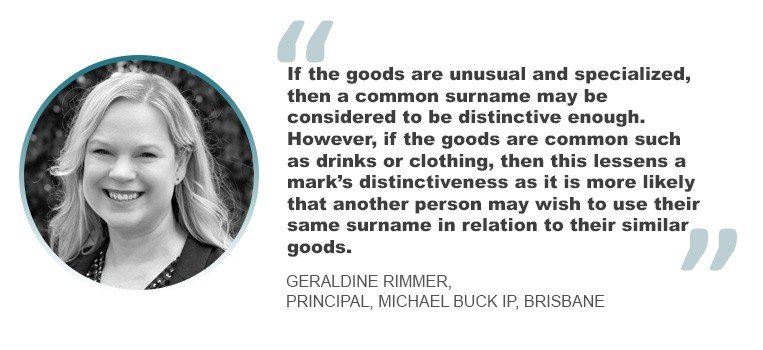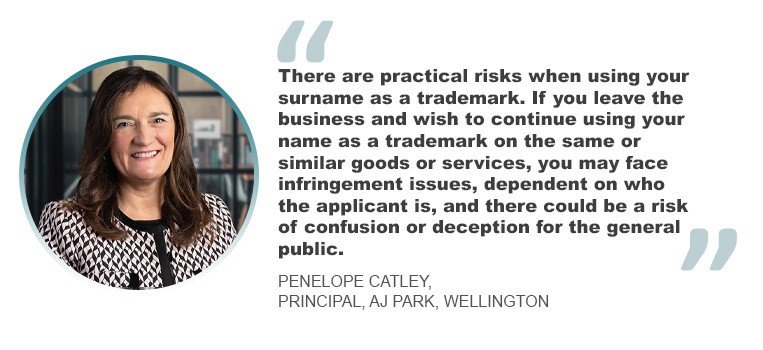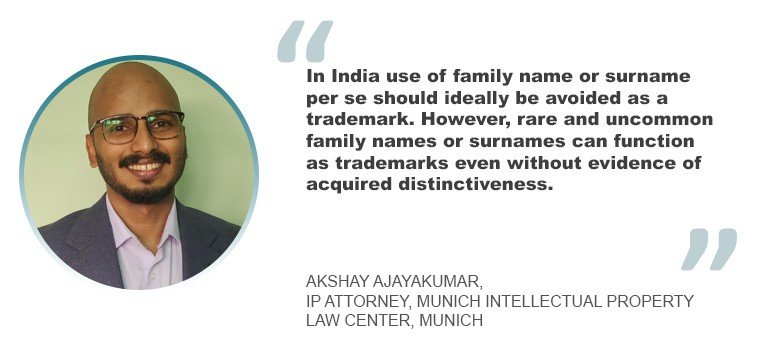Creating a family business: Surnames and trademarks
30 September 2022

Choosing an appropriate business name is crucial when launching a business because the name will affect the development and impression of the brand. For many family-owned businesses, its name and surname are sometimes inexorably and reputably intertwined. For instance, several well-known companies, including Dell, Guinness, Johnson & Johnson, McDonald’s, and Chase, have been named after their founders.
However, some trademark statutes, such as the Lanham Act in the United States, prohibits the registration of marks that are “essentially just a surname” without a proof of “acquired uniqueness” since surnames are shared by several people, each of whom may have an interest in utilizing that person’s surname in business.
Can you register a surname in Asia-Pacific jurisdictions? And what, then, are the things to think about when selecting a company name or trademark, and how can you increase your chances of getting it registered if you do decide to use your surname as a trademark? We asked lawyers from around the region for their thoughts.
Using surnames as trademarks
The law in Australia tends to support the notion that traders should be able to use their own surname.

Geraldine Rimmer, a principal at Michael Buck IP in Brisbane, says that if a surname is common in Australia (there is a threshold check of the electoral roll upon examination), then it is not likely to be accepted as it is less likely to be inherently adapted to distinguish just one trader’s goods and services.
“Further, the goods and services will be taken into consideration. If the goods are unusual and specialized, then a common surname may be considered to be distinctive enough,” she says. “However, if the goods are common such as drinks or clothing, then this lessens a mark’s distinctiveness as it is more likely that another person may wish to use their same surname in relation to their similar goods. Also, if the surname has other meanings in the English language, it can be argued that a consumer may not think of the name as a surname, but by its other meaning.”

In New Zealand, as with other categories of marks, the Intellectual Property Office of New Zealand (IPONZ) considers whether the mark is capable of distinguishing the goods or services of one trader from the same or similar goods or services supplied by other traders. “Therefore, to register a surname as a trademark, the name must have distinctive character. Surnames that have no distinctive character are not registrable under Section 18(1)(b)” of New Zealand’s trademark act,” says Penelope Catley, a principal at AJ Park in Wellington.
She says that the registration of a surname as a trademark cannot also be refused to ensure that no advantage is given to the first applicant who wants to use that name.
“IPONZ considers whether the mark is capable of distinguishing goods or services of one trade from the same or similar goods or services supplied by other traders,” she says. “Where a mark consists of a surname which also has another meaning, that meaning may give rise to an objection under Section 18(1)(c). When IPONZ examines the eligibility of marks consisting of surnames they can take into consideration facts which are generally known. For example, it is common for tradespeople to use surnames in their businesses, and on this basis IPONZ might conclude that a mark that consists of a common surname such as Smith when used in relation to plumbing or electrical services would not be capable of distinguishing the services of one trader from the same or similar services supplied by other traders.”
Furthermore, applicants who apply for a trademark consisting of a full name should be aware that the application may be subject to an objection under Section 23 of the Act.
“The commissioner has the discretion whether to register marks that contain the name or representation of a person. If a mark contains the name or representation of a person, the commissioner may require the written consent of the person or the person’s legal representative,” says Catley. “However, in practice, the commissioner will not raise a concern where it is clear that the applicant is the person referred to in the mark.”

Challenges and risks
According to Akshay Ajayakumar, an IP attorney at the Munich Intellectual Property Law Center (MIPLC) in Munich and a former senior consultant at Sim and San in Faridabad, marks consisting of a family name or surname are prima facie considered as not capable of distinguishing goods or services in India.
“This is primarily because Section 35 of the Indian Trademarks Act, 1999 protects bona fide use of name, address and description of goods or services,” he says. “Consequently, any person with the same family name or surname may make bona fide use of that name in the course of the trade. Bona fide in this sense means ‘honest use by a person of his own name’ with no intention to deceive or encash upon the goodwill of another trader.”
He adds that usually, an objection regarding distinctiveness will be raised in the case of marks consisting of a family name or surname and it can usually be overcome only by establishing that the mark has acquired distinctive character by prior use.”
“Therefore, ideally marks consisting of a family name or surname should be avoided as it will be hard to gain exclusivity over the same,” he says. “The only way forward for a family name or surname in India is if it has acquired distinctiveness through prior use. In India use of family name or surname per se should ideally be avoided as a trademark. However, rare and uncommon family names or surnames can function as trademarks even without evidence of acquired distinctiveness.”
Ajayakumar suggests that surnames can often be trademarked in India with just a few additional steps, noting that for a surname to be registrable, it should look and sound less like a surname to improve the chances of registration:
-
Use your first name along with your surname;
-
Add arbitrary elements (like words or numbers) to your surname;
-
Stylize and include figurative elements in the mark;
-
Avoid picking common surnames used in a particular industry as a trademark; and
-
Avoid applying for marks on an intent to use/proposed to use basis, as common surnames can only be protected in many countries by showing acquired distinctiveness.
Catley injects that a “name” is included in the definition of “sign” in Section 5 of New Zealand’s act – it therefore follows from this that surnames are potentially registrable as trademarks.
“A surname will not be registrable, however, if it has no distinctive character,” she says. “This creates problems where surnames are common or have another descriptive meaning. For example, Brown, which could serve, in trade, to designate a kind of sauce or because it designates a characteristic of those goods, namely colour.”
She continues, “There are also practical risks when using your surname as a trademark. This is because if you leave the business, and wish to continue using your name as a trademark on the same or similar goods or services, you may face infringement issues, dependent on who the applicant is, and there could be a risk of confusion or deception for the general public.”
So, you still want to use your surname as a trademark?
If, after reading this story, you still want to go ahead with using your surname as a trademark, Geraldine Rimmer, a principal at Michael Buck IP in Brisbane, has a few pointers:
-
Combine your surname with a distinctive word or logo;
-
Combine your surname with another surname, as this makes it more distinctive. For example, “Smith Collins” as a whole is prima facie distinctive;
-
Only use your surname if you are in an uncommon and highly specialized field;
-
If you strongly wish to obtain registration of your surname, then use it for a significant amount of time prior to seeking registration, in which case you may be able to convince a trademarks examiner that, through your use, the mark has become distinctive and associated with your business; and,
-
To make your surname more distinctive, you could change some letters in your surname so it is phonetically the same but looks different. For example, instead of “Jones”, you could use “Joanz”.
- Excel V. Dyquiangco






